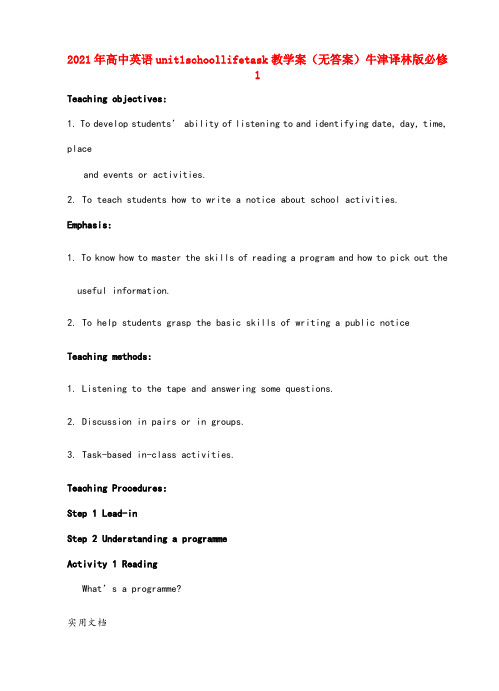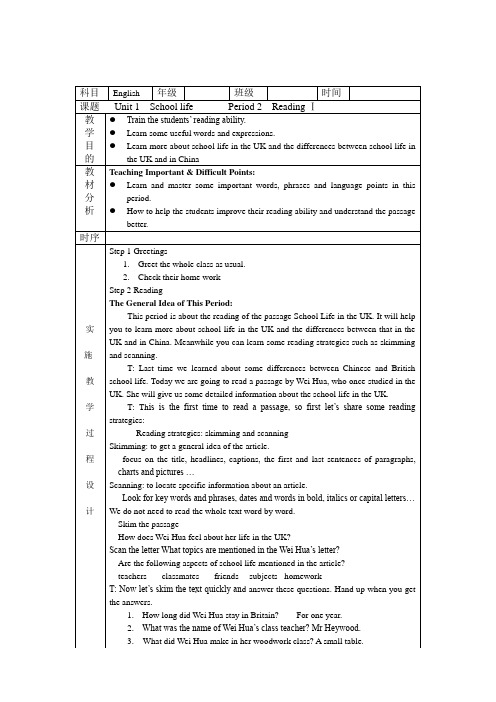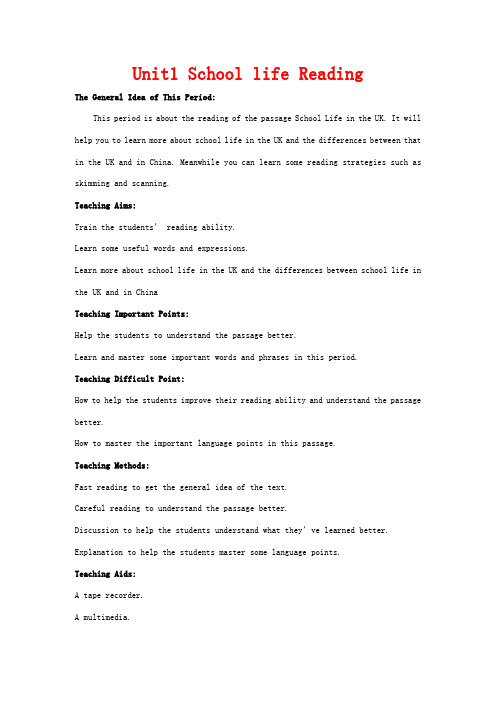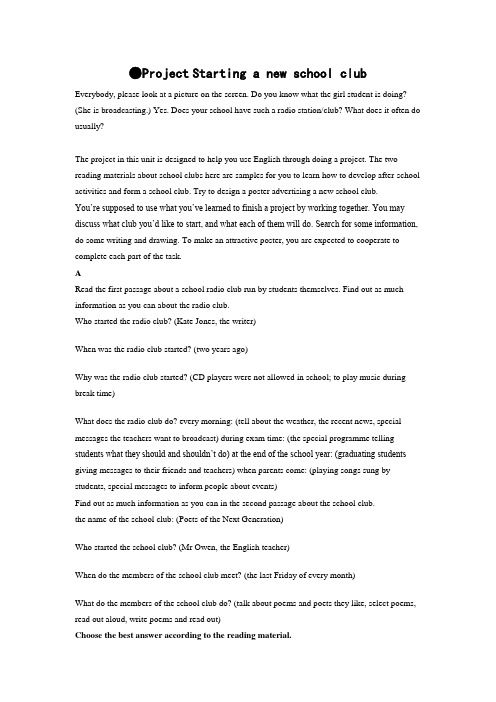【同课异构】高一英语(牛津译林版)必修一教案 UNIT1School life《Task》教案3
2021-2022年高中英语unit1schoollifetask教学案(无答案)牛津译林版必修1

2021年高中英语unit1schoollifetask教学案(无答案)牛津译林版必修1Teaching objectives:1. To develop students’ ability of listening to and identifying date, day, time, placeand events or activities.2. To teach students how to write a notice about school activities. Emphasis:1. To know how to master the skills of reading a program and how to pick out the useful information.2. To help students grasp the basic skills of writing a public notice Teaching methods:1. Listening to the tape and answering some questions.2. Discussion in pairs or in groups.3. Task-based in-class activities.Teaching Procedures:Step 1 Lead-inStep 2 Understanding a programmeActivity 1 ReadingWhat’s a programme?实用文档What does a programme usually include?Activity 2 Learning some short formsDate1st January → ___________________ 3rd September → ___________________ DaySunday → ___________________ Thursday → ___________________星期一__________________ 星期二___________________星期三_________________ 星期五______________ 星期六______________2月2日__________________ 5月5日_____________________8月3日__________________ 10月21日___________________Activity 3 Listening practiceStep 3 Writing a noticeActivity 1 Finding some important information :1.What’s a notice?2.What should be mentioned in a notice?3.Read “Reader Notice”. Try to find the important information:实用文档Event: _________________Time: _________________Reason: _________________When to reopen: ____________________________The new opening hours: ____________________________________________________________________________________Person that gives the notice: ____________________________Activity 2 Tips on writing a notice and the format of a notice:一审体裁:应用文二审结构: 通知主要包括标题、正文、发出通知的单位和时间。
【同课异构】高一英语(牛津译林版)必修一教案 UNIT1School life《Reading》教案4

1.What time do British Schools usually begin?9 a.m
Look for key words and phrases, dates and words in bold, italics or capital letters…
We do not need to read the whole text word by word.
Skim the passage
5.British students can only study two languages: English and French.
6.British students eat a lot of fruit.
7.Wei Hua enjoyed playing football.
iled-reading
A:I like English and Chinese best. Do you think we should learn more foreign languages?
7.Which British city did Wei Hua go to?Manchester.
Write down the new words the students have just listed.
Do Part C on P4
T: First some true or false questions. If it is false, please try to correct it.
高中英语 Unit1 School life Reading教案 牛津译林版牛津版高一英语教案

Unit1 School life ReadingThe General Idea of This Period:This period is about the reading of the passage School Life in the UK. It will help you to learn more about school life in the UK and the differences between that in the UK and in China. Meanwhile you can learn some reading strategies such as skimming and scanning.Teaching Aims:Train the students’ reading ability.Learn some useful words and expressions.Learn more about school life in the UK and the differences between school life in the UK and in ChinaTeaching Important Points:Help the students to understand the passage better.Learn and master some important words and phrases in this period.Teaching Difficult Point:How to help the students improve their reading ability and understand the passage better.How to master the important language points in this passage.Teaching Methods:Fast reading to get the general idea of the text.Careful reading to understand the passage better.Discussion to help the students understand what they’ve learned better. Explanation to help the students master some language points.Teaching Aids:A tape recorder.A multimedia.Teaching Procedures:Step 1 Greetings1.Greet the whole class as usual.2.Check their home work.Step 2 Reading1. DiscussionT: Last time we learned about some differences between Chinese and British school life. First let’s work in groups and have a discussion about the school life in the UKAsk the students to have a discussion in groups.T: Today we are going to read a passage by Wei Hua, who once studied in the UK.She will give us some detailed information about the school life in the UK.2. Reading strategyT: This is the first time to read a passage, so first let’s share some reading strategies:Reading strategies: skimming and scanningWe skim a text when we want to get a general idea of what it is about. We look at the titles and headlines, the first and last sentences of paragraphs and the first and last paragraphs as well as pictures and charts to guess what the text is about.When we want to find certain information in a text quickly, we scan the text for key words and phrases, dates, numbers, etc. We do not need to read the whole text word by word.3. Skimming and scanningT: Now let’s skim the text quickly and tell the topics mentioned in the text.Next let’s scan the text and answer these questions. Hand up when you get the answers.(T show the questions on the screen.)1. How long did Wei Hua stay in Britain?2. What was the name of Wei Hua’s class teacher?3.What did Wei Hua make in her art class?Suggested answers:1.For one year.2.Mr Heywood.3. A small sculpture.T: Now let’s do some true or false exercises.(T may begin with the T/F questions orally and this is also a good time to test their listening abilities as well as their comprehension of the text.) T: First some true or false questions. If it is false, please try to correct it.1.Wei Hua’s favourite teacher was Mr Heywood.2.Most British classes have fewer than thirty students.3.Wei Hua had more homework in her school in China.4.It was very expensive for Wei Hua to communicate with her parents.5.In the UK, students can choose to stop studying any subject.6. The cake made by Wei Hua did not taste good.Suggested answers:1. Study and high grades2. Because they had different students in some classes.3. Because all the homework was in English.4. All her teachers5. She used English every day and spent an hour each day reading English books in the library.6. Desserts.( You may have some links on the screen when you want to explain those useful expressions , or just explain those on the Bb listed by the students . ) 4. Detailed readingNow let’s read the passage again carefully to check the answers. Underline the new words in the text. Meanwhile, some more questions are waiting for you.(First go through the questions so that they know what to find out. Give thema chance to discuss with their partners if they want)1.What time do British Schools usually begin?2.What time do they usually end?3.On average, how many students are there in a class in the UK?4.Why did Wei Hua find her homework difficult at the beginning of her studyin the UK?5.On Tuesdays, what did Wei Hua do in evening?6.What do British students usually eat after their main meal?7.Which British city did Wei Hua go to?(Write down the new words the students have just listed.)T: Next let’s do some multiple choices and try to choose the best answers to the questions.5. ConsolidationAsk the Ss to talk about the topics mentioned in the text and then fill in the forms.6. Careful reading and practiceAsk the Ss to match the words with correct definitions.Further discussion:Ask the Ss to talk about the two questionsPractice, Listening and ConsolidationT: Now let’s do practice and review some useful words in the text.Next, let’s listen to the tape. You may follow it while listening and please pay attention to your pronunciation.(The teacher plays the tape for the students to listen. After that the teacher gives the students a few minutes to read aloud the passage. Meanwhile, the teacher asks the students to try to remember some details.)T: Please turn to Page 5.Let’s do Exercise E. Complete the letter to Wei Hua using the words below.Suggested answers:1.experienced2.fond3.literature4.dessert5.struggle6.respect7.encouragementStep 3 Discussion:T: Now you’ve known much about Wei Hua’s school life in the UK. From the text we know that they have a variety of subjects to choose from. You may be quite puzzled whether it is necessary for senior students to learn some of them, such as so many languages and art. Here let’s have a discussion: Should students learn more languages? Why or why not?What subjects would you like to take if you could choose? Why?T: Use the conversation below as an example:A: What subjects do you like best and least?B:I really enjoy Cooking and Art classes, because I like making things, but I ‘m not very good at History.A:I like English and Chinese best. Do you think we should learn more foreignlanguages?Perhaps we should learn….Step 4 Summary and HomeworkT: Today we’ve learned a text about Wei Hua’s experience in the UK. First we learned some reading strategies: skimming and scanning. Master these and put them into use in future while reading. Through reading we know there are many differences both in the timetable and in the curriculum. Read the passage after class and get familiar with these language points. Have a further discussion with your partners about the topic in Part F.。
Unit 1《School life》Task教案5(牛津译林版必修1)

Answers:
Date
Day
Time
Venue
Activity
21st Oct
22nd Oct
23rd Oct
Mon
Tue
Wed
9:30 a.m.
1. Read the five points in Skills building 1 on page 12. Write down the names of months and the seven days of a week in abbreviations. For example, 2nd/2 Feb; 5th/5 Mar; 3rd/3 Aug; 21st/21 Oct; 30th/30 Nov; Mon; Wed; Tue; Fri; Sat
Here you can find out what a programme usually includes when you read the guidelines and you will know what you should notice when you are listening to someone talking about a programme.
2. Listen to the tape and finish the timetable on page 12.
Tapescript
Reporter:Good morning, Mr Gu. What’s your programme like for next week?
【同课异构】高一英语(牛津译林版)必修一教案 UNIT1 school life《Project》教案1

●Project Starting a new school club Everybody, please look at a picture on the screen. Do you know what the girl student is doing? (She is broadcasting.) Yes. Does your school have such a radio station/club? What does it often do usually?The project in this unit is designed to help you use English through doing a project. The two reading materials about school clubs here are samples for you to learn how to develop after-school activities and form a school club. Try to design a poster advertising a new school club.You’re supposed to use what you’ve learned to finish a project by working together. You may discuss what club you’d like to start, and what each of them will do. Search for some information, do some writing and drawing. To make an attractive poster, you are expected to cooperate to complete each part of the task.ARead the first passage about a school radio club run by students themselves. Find out as much information as you can about the radio club.Who started the radio club? (Kate Jones, the writer)When was the radio club started? (two years ago)Why was the radio club started? (CD players were not allowed in school; to play music during break time)What does the radio club do? every morning: (tell about the weather, the recent news, special messages the teachers want to broadcast) during exam time: (the special programme telling students what they should and shouldn’t do) at the end of the school year: (graduating students giving messages to their friends and teachers) when parents come: (playing songs sung by students, special messages to inform people about events)Find out as much information as you can in the second passage about the school club.the name of the school club: (Poets of the Next Generation)Who started the school club? (Mr Owen, the English teacher)When do the members of the school club meet? (the last Friday of every month)What do the members of the school club do? (talk about poems and poets they like, select poems, read out aloud, write poems and read out)Choose the best answer according to the reading material.1. What was the school radio club started for at first?A. To inform teachers in school of important things.B. For playing music for everyone during break time.C. To broadcast special messages.D. For students to learn English by listening to radio.2. Which of the following is not included in the programmes of the school radio club?A. How to go on diets and keep slim.B. Special messages to students by teachers.C. Songs sung by students.D. Advice to students on preparations for exams.3.Which of the following statement is not right according to the project?A. The radio club can not only be helpful to students but also can keep parents informed of school events.B. I, as one of the club hosts, like the club very much.C. The club is much more than just music.D. Although I have graduated from school, yet I miss the club and often visit it.Keys: BADWhat do you think about the two articles? Whether you would like to start a club to do something you’re interested in?Now let’s deal with Pa rt B1 on page 87 in Workbook to know better how to use the useful phrases in the two passages.Read Part B2 on the same page to identify the different usages of talk, tell, speak, say and read. (To review the words and sentence patterns in this unit, you can do Parts D1 and D2 on page 89 in Workbook as your homework, and design a poster.)BEnjoy a poster, please.Two questions to answer.1. What does the poster consist of?2. How does it attract its viewers?PlanningWork in groups of four. Discu ss and choose what school club you’d like to start in your class or school. Divide the tasks among group members. Fill in the blanks in this part.PreparingMembers responsible for different tasks should make preparations and answer the questions in this part. Then you can meet, discuss and select from the information found.ProducingThose who are making the poster will draft the poster based on all the ideas from the group’s research and discussion. When the poster is finished, each group member should read it carefully and give suggestions to make it more attractive.PresentingNow time to present your posters to the whole class. Talking about your club and display your posters in the classroom so that other students choose which school club they would like to attend. AnswerPart B1 (p87)1 reads out 3 such as 5 is allowed to 7 gives to2 inform of 4 are required to 6 making preparations for 8 much more thanPart B2 (p87)1. talk 3. tell 5. said 7. say talked talked 9. read2. read spoke 4. speak 6. speak 8. toldPart D1 (p89)1. exciting 3. achieving 5. selected 7. attend2. prepare 4. clubs 6. Literature 8. experiencePart D2 (p89)1. I think the best way to protect the environment is to plant more trees.2. Going to the park for a picnic on the weekend sounds like a good idea.3. In summer holidays he spent most of his time surfing the Internet.4. The girl who used to be a model is now a famous actress.5. Talk to he r more, and you will find that she isn’t as bad as you thought she was.6. As it was getting dark, I decided to find a place to stay.7. “Stop shouting! You are giving me a headache,” said mother angrily.8. Though it is difficult to improve your handwriting in such a short time, you should still keep practising.Part A (p90)1. It will help them feel like part of a group and also it will make the school’s sports teams feel proud.2. To gain knowledge.3. Because they are comfortable and do not need special care.4. He thinks they look very boring.5. No. He thinks that students could wear their leisure clothes outside of school.Part B (page 91)1. They have to pass the SATs, complete application forms and write letters to the colleges.2. She can help students choose a good college.3. Because students do not study the same subjects.4. They might go to school early to use the Internet service and they might stay late if theyhave after-school activities to go to.5. Participating in various after-school activities.。
高一英语牛津译林必修一同步课件:Unit 1 School life task(共37张PPT)

2.What’s the important information about a notice?
time, dates, events, person who is giving the notice
Event: Time:
library closed next Wednesday to Friday, 15th to 17th September
High School?
C
A. Give a talk to the students
B. Attend an important school
meeting.
C. Go to a school concert.
Listen again and fill in blanks
Mr Gu’s programme for next week
4. Which school will he go to on the evening of 23 Otc?
C A. Datong High School. B. Guanghua High School. C. Xiangming High School.
5. What will he do at Xiangming
school concert
Skills building 3 writing a notice
1.What is a notice?
A notice is a piece of paper which gives written or printed information before something is going to happen. It’s usually put in a public place.
2019-2020年牛津译林版高中英语必修一Unit 1《School Life》(Welcome to the unit)教案
重点
How to enable the Ss to master the pronunciations of some words and its basic usages.
Do you know the differences of school betweenChinaandUK?
Step three: Lead in
School life of the welcome
This is the subject of our first unit. Today we are going to look at schools in the United Kingdom and try to work out if they are the same or different from schools in China. Here are four pictures that show some aspects of school life in theUK. Please look at the pictures, read the instructions and tr y to determine the differences between schools inChinaand theUK
难点
Different forms of the new word
教法及教具
Blackboard speaking discussion
教
学
过
程
教学内容
个案调整
教师主导活动
高中英语(必修一译林牛津版)课件:必修1Unit1Schoollife——task(共88张)
湖南长郡卫星远程学校
制作05
2014年下学期
What is a programme?
A plan of activities to be done or things to be achieved.
工作计划,活动安排,行动方案
(Oxford Advanced Learner’s Dictionary)
What is a programme?
湖南长郡卫星远程学校
制作05
2014年下学期
What is a programme?
A plan of activities to be done or things to be achieved.
工作计划,活动安排,行动方案
(Oxford Advanced Learner’s Dictionary)
湖南长郡卫星远程学校
制作05
2014年下学期
What is a programme?
A plan of activities to be done or things to be achieved.
工作计划,活动安排,行动方案
(Oxford Advanced Learner’s Dictionary)
湖南长郡卫星远程学校
制作05
2014年下学期
date
How to ask date? 1st January on 1(st) Jan.; Jan. 1(st)
Can you spell the 12 months in English?
湖南长郡卫星远程学校
制作05
2014年下学期
date
How to ask date?
1st January on 1(st) Jan.; Jan. 1(st)
牛津译林版高一英语必修一课件:Unit1 School life--Task
six p.m. on the twenty-third.
Reporter: Wow! You are really busy. I
look forward to seeing you
again on Monday. Hello!
Skills building 1:
understanding a programme
Discussion Pair work
1.What is a program? 2.What are usually included in a program?
A programme is a plan of activities to
be done or things to be achieved. A programme usually includes: Date Dates in a progamme are usually presented in short form to save space. For example:
Step1: completing a timetable for a
school programme
The headmaster is having a meeting
with monitors of all classes. He is
telling everyone about a programme of
Time Time can be presented in several ways: 9 a.m./09.00 4 p.m./16.00 8.50a.m./08.50 6.45p.m./18.45 Place There are many places for events or activities. For example: school hall meeting room 7th floor, Park Hotel
【教学】牛津译林版英语高一上册Module1Unit1Schoollifeword教案
【关键字】教学I.单元教学目标The First PeriodThe Second Period Function and writingThe Third Period Listening and speakingThe Forth Period Language studyThe Fifth Period Integrating skillsThe Sixth Period WritingUnit 1 School life 单元教学目标II. 目标语言Ⅲ. 教材分析与教材重组1. 教材分析本单元以School life为话题,旨在通过单元教学使学生了解英国校园生活的一些基本情况及中英两国校园生活的不同之处;学习并能运用表示校园设施的一些基本词汇;学习定语从句的基本概念及关系代词的用法;能就校园活动的话题展开讨论;能就校园活动情况向班任老师做出报告;学习通知的写法;学会设计以介绍学校俱乐部为主题的海报等。
1.1 Welcome to the unit 部分利用四幅图片,分别从(校园风貌、生活设施、课堂教学、师生关系)四个不同的侧面介绍了英国校园生活的有关情况。
该部分还设计了三个讨论话题,引导学生对中英两国校园生活进行比较,并就相关话题发表自己的看法。
1.2 Reading部分的短文节选自一份校园杂志。
文章由一位交换留学生所写。
作者通过自己的亲身经历简要地介绍了英国学校生活的一些情况。
文章前后分别设计了五个部分的练习:前两个练习(A、B)要求学生运用本单元介绍的两种基本阅读方法(skimming and scanning)阅读文章,把握文章主旨大意,了解文中明显的细节内容;练习C1通过问题的形式考查学生对文中具体信息的把握程度;C2通过判断正误练习加深学生对阅读材料的理解;D部分为词汇练习,要求学生首先联系上下文猜测所给词汇的含义;然后通过配对练习帮助学生掌握新词的含义和用法;E部分要求学生通过运用所给词汇填空的方式完成一封英国学生写给Wei Hua的信件,以进一步加深学生对阅读内容的理解;练习F设计了两个话题,引导学生对校园生活有关话题展开讨论,以获得对文章深层次的理解。
- 1、下载文档前请自行甄别文档内容的完整性,平台不提供额外的编辑、内容补充、找答案等附加服务。
- 2、"仅部分预览"的文档,不可在线预览部分如存在完整性等问题,可反馈申请退款(可完整预览的文档不适用该条件!)。
- 3、如文档侵犯您的权益,请联系客服反馈,我们会尽快为您处理(人工客服工作时间:9:00-18:30)。
Unit 1 School life Task Reporting school activities
As we all know, there are various school activities for students to attend. What school activities do you often have? Can you name some? This section consists of a series of activities which provide you with opportunities to practise your language skills of listening, reading, speaking and writing. It is divided into three steps, and each step is preceded with a skills building activity. Through the three steps, you will learn to solve a practical problem in your daily life--how to talk about school activities and how to write a notice about a school activity.
Skills building 1: understanding a programme Suppose you are monitor of a class and you are to plan and arrange a class meeting for parents to visit your school. What will be informed your classmates of about the class meeting? That is to say, what will be included in your plan?
Here you can find out what a programme usually includes when you read the guidelines and
you will know what you should notice when you are listening to someone talking about a programme. 1. Read the five points in Skills building 1 on page 12. Write down the names of months and the seven days of a week in abbreviations. For example, 2nd/2 Feb; 5th/5 Mar; 3rd/3 Aug; 21st/21 Oct; 30th/30 Nov; Mon; Wed; Tue; Fri; Sat 2. Listen to the tape and finish the timetable on page 12. Tapescript Reporter: Good morning, Mr Gu. What’s your programme like for next week? Scientist: On the twenty-first of October, that’s Monday, I will visit your school, Datong High School, at nine thirty in the morning, I will give a talk to the whole school. At a quarter to one in the afternoon on the twenty-second, I will attend an important school assembly at Guanghua High School, and I will go to the school concert at Xiangming High School at six p.m. on the twenty-third. Reporter: Wow. You are really busy. I look forward to seeing you again on Monday. Answers: Date Day Time Venue Activity 21st Oct 22nd Oct 23rd Oct Mon Tue Wed 9:30 a.m. 12:45 p.m. 6:00 p.m. Datong High School give a talk attend an important school assembly go to the school concert Step1: completing a timetable for a school programme This part is designed to help you develop your listening skills by listening to a talk given by the headmaster about a school programme. Complete the programme according to what the headmaster says. Identify the times, venues, subjects of some talks and who the speaker is. 1. Read the guidelines on page 13 to know what you’re to do and then read the timetable to get a general idea about the talk. 2. Listen to the tape and complete the timetable individually. We’ll then check the answers. Tapescript Headmaster: Next month we are going to have several talks. We have invited eight people with different jobs to give us talks on different subjects. Each class can choose up to five talks according to your class timetable. Monitors, you have to make sure you understand when and where each talk is to be given. You also have to be sure about the subjects and who the speakers are and then report to your class. First of all, we have a famous writer coming on Friday, the eighth of October. He is going to talk about how to read a novel. The talk will be held in Room Two-o-one, Building Four, beginning at one twenty in the afternoon. At two fifteen on Monday afternoon, the eleventh of October, a fireman is going to talk about fire prevention, in Room Five-o-three, Building Three. A student from the USA is going to talk about school life in the USA on Wednesday, the thirteenth of October. The talk will be held at three p.m. We have invited ... Monitor 1: Excuse me, Mr Liu, where is the talk about school life in the USA going to be held? Headmaster: Oh, yes. It’ll be held in Room Four-o-four, Building One. Mornitor 1: Thank you. Headmaster: OK. On Tuesday, the nineteenth of October, we have invited a scientist to talk about outer space in Room One-o-five. Building Two, at eight o’clock in the morning. Monitor 2: That’ll be interesting. Headmaster: I’m glad you like that idea. Now, let’s carry on. A doctor is going to talk about fighting AIDS at half past two in the afternoon on Thursday, the twenty-first of October, in Room Three-o-six, Building Four. A newspaper reporter from Football Weekly is going to talk about famous football players, at one twenty p.m. on Friday, the twenty-second of October in Room Two-o-four, Building Three. Monitor 3: Is it about football players in China? Headmaster: Not only that. It is about football players around the world. Monitor 3: Great! Headmaster: Now let’s go on. A policeman is going to talk about traffic signs at ten past __on the morning of Wednesday, the twenty-seventh of October, in Room Four-o-one, Building Two. Now the last talk. The subject is Australian pop songs. It’ll be given by a famous singer at ten a.m. on
